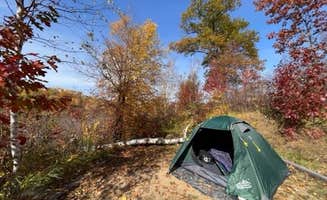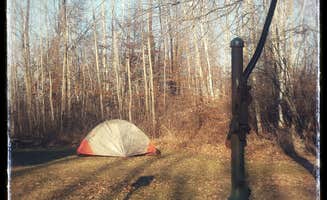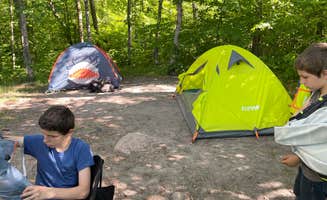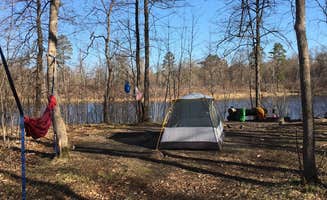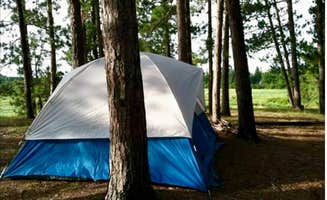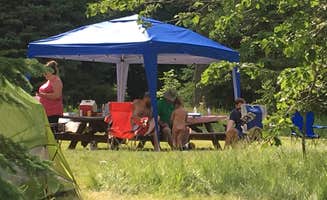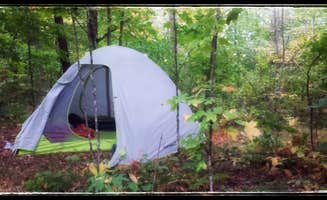Tent campsites near Nevis, Minnesota sit within the rolling, glacial moraine landscape of north-central Minnesota. Most area campgrounds rest at elevations between 1,400-1,500 feet above sea level with sandy soil conditions common throughout. Winter temperatures regularly drop below 0°F while summer nights stay cool, typically between 50-60°F even during July and August.
What to do
Explore interconnected trail systems: The North Country Trail passes through multiple camping areas, including Gardner Lake Campsite, where one camper noted it was "a 2.5 mile hike of all sorts of terrain. Scenery was perfect." The trail connects many glacial lakes and creates figure-8 patterns for day hiking opportunities.
Observe wilderness wildlife: Dawn and dusk wildlife viewing opportunities abound at Deer Park Lake Backcountry Campsite, where campers reported "I woke up to trumpeter swans each day" and another camper mentioned "trumpeter swans, loons and beavers" being visible from their site. Many backcountry lakes have minimal human presence.
Paddle secluded waters: Multiple small lakes only allow non-motorized watercraft, reducing noise and improving fishing conditions. At Lake Twentyone Watercraft Site, one visitor described it as having a "rustic access for your canoe or kayak" and being situated on a "small unmotorized lake makes for a quiet and peaceful stay."
What campers like
Affordable rustic camping: Most primitive sites in Paul Bunyan State Forest charge minimal fees with no reservations required. A camper at Gardner Lake Campsite mentioned "It was mosquito free till darkness set in," highlighting the relatively comfortable conditions despite the remote location.
Convenient water access: Waterfront sites with direct lake access prove popular throughout the region. At Lake Twentyone Watercraft Site, one reviewer appreciated the "nice waterfront site great for having kayaks and paddle boards" with "enough space for a few small tents and trees for hanging hammocks."
Dark skies for stargazing: The region offers exceptional night sky viewing due to minimal light pollution. A visitor to Iron Corner Lake Remote Backpacker Site noted it provides "dark skies at night" alongside being "quiet, rustic, pristine" – perfect conditions for astronomy enthusiasts.
What you should know
Cell service limitations: Coverage becomes spotty to non-existent at most backcountry sites. However, one camper at Deer Park Lake Backcountry Campsite mentioned "I was also able to get internet so I was able to see a big storm coming," suggesting some sites maintain partial connectivity.
Water filtration necessity: While several campgrounds have water pumps, most backcountry sites require filtration. A visitor noted at one site that "Water is weedy, but is filterable for boiling water," indicating preparation is needed for water sources.
Variable site conditions: Space limitations affect group capabilities at some locations. A camper at Gardner Lake Campsite observed "Not much for available tent sites or hammock sites. It could fill up fast," while another noted it would be "perfect for a solo hiker or a couple."
Tips for camping with families
Choose accessible remote sites: Family groups can find backcountry experiences without difficult hikes. At Halverson Trail Camp on McCarty Lake, a visitor noted it's "about a 10-15 min drive from main road" while offering "water access, fire pit and outhouse."
Look for sandy beach access: Several locations offer child-friendly water entry points. One camper at Gulch Lake mentioned "Sites are very wooded and private and situated along trails and the lakes" with "a clean and nice boat access with a covered sitting area near it."
Consider weather contingencies: Sudden storms can develop quickly in summer months. A camper at Deer Park Lake Backcountry Campsite shared how "The birds and insects were suddenly silent and the clouds came in fast. I was able to check weather apps and go to the shelter a mile toward the parking lot and wait out the storm."
Tips from RVers
Plan for primitive conditions: RV sites throughout the area lack hookups and typically feature smaller pads. Frames Landing Campsite can accommodate RVs with one visitor noting "in dry weather you could get an RV into the campground if you don't mind no hookups."
Limited turning radius: Forest road access to many campgrounds involves narrow, winding roads. At Gulch Lake, a visitor warned "The road can also be pretty tough so be prepared if your pulling a trailer," indicating careful navigation is required.
Consider satellite camping options: Smaller trailers and pop-ups work better than large motorhomes. A camper at Andersons Crossing mentioned it was "a great campsite for the 7 of us," suggesting it can accommodate multiple people with appropriate vehicle setups.


